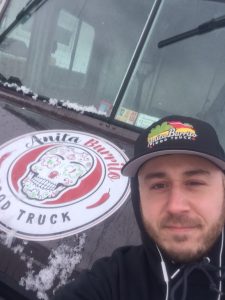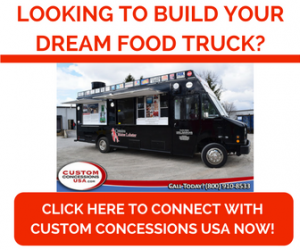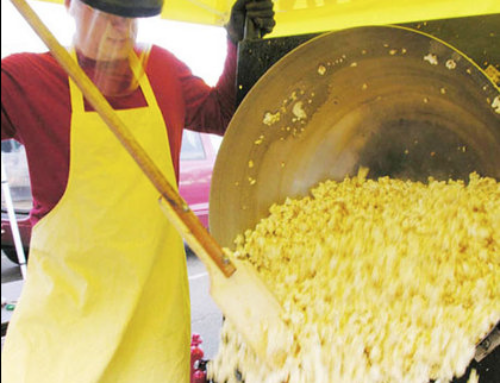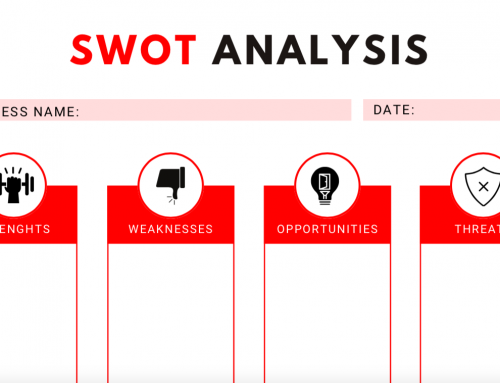Nick Baxter, owner and founder of the Anita Burrito food truck, took the non-traditional route to food truck success. Nick’s business is not on social media. The Anita Burrito food truck operates out of a fixed location and is only open for lunch service (no catering). Finally, Baxter operates his food truck by himself without help from employees.
True to form, Nick’s path to becoming a business owner was anything but traditional as well. After falling in love with the food service industry in college, Nick quickly discovered that there wasn’t much money to be made as a professional cook. After cooking at a variety of local restaurants and pizza parlors, Nick decided to make a career move and get into retail management and began working at a casino in the finance department in an effort to improve his business acumen. Nick’s goal was to get knowledge about the financial or business side of operating a restaurant that he didn’t have the opportunity to master while being a cook.

Nick Baxter, Owner of the Anita Burrito Food Truck.
During this time period Nick started making good money. It had been five or six years since leaving the kitchen and I had just filled up dozens of notebooks with what I considered to be business plans, menus, recipes and different ideas. Nick diligently saved his money during this time period, found a prospective restaurant location and decided to head to the bank for the last step: securing a loan to launch his restaurant.
A Rude Awakening and Cross Road
It was at that point Nick got a rude awakening. The bank manager explained in horrific detail why more money would be needed to start Nick’s dream restaurant. The location Nick selected would need to be gutted, the taxes would be higher than anticipated and eat into profitability, finally wages would sink the business. “He basically told me I would fail,” said Nick. Needless to say, Nick walked away from the meeting without a loan.
While Nick left the bank severely bummed, he recognized this was a crossroads for his dream and identified he didn’t have a solid foundation in business and finance yet. Instead of getting frustrated and give up on his dream, he chose to get a job at a bank so he could begin to learning what it took to run a restaurant from a financial perspective. Shortly after this meeting, Nick walked down to the largest bank in town and got a job as a bank teller.
Working at a bank turned out to be the right decision for Nick. Nick got introduced to many of the restaurant owners around town that would come to the bank to make their daily deposits. Not only did Nick get the opportunity to get introduced to restaurant owners, but he gained insight into what certain businesses did right financially as well as the pitfalls.
One of the most important lessons learned during Nick’s time at the bank is that the appearance of success does not always translate to money in the bank in the restaurant industry. Some of the biggest and wealthiest looking restaurant owners actually had negative account balances. While tiny ma-and-pa operated places would have tens of thousands of dollars or even hundreds of thousands of dollars in cash in the bank.
What was the primary reason that allowed the little pizza parlor or Chinese restaurant to remained so profitable while the big fancy restaurants were on the brink of being shut down? The smaller restaurants were able to keep costs low. These restaurants didn’t need to pay for a large staff, they weren’t in the highest rent locations. More often than not, these small owners were extremely involved in the daily operation of their business. They were the ones coming into the bank smelling like a deep fryer because they’ve been cooking all day at their own restaurant. But by keeping their costs low, these owners are able to deposit a much larger percentage of their sales into the bank account at the end of the day.
After gaining this understanding, Nick switched from thinking about starting a restaurant to a food truck instead as it was the food business model with the lowest overhead. Due to Nick’s prior experience working in a Tex-Mex restaurant, he chose the Mexican food concept. Additionally, Nick could use the Subway style model of creating food by pre-heating hot food and assembling the menu items at the time of order to keep everything efficient.
In today’s interview Nick reveals how he’s able to keep costs low and operate a truck by himself while working bankers hours. While Anita Burrito is only open from 10:30 a.m. – 1 p.m. from Monday – Friday, Nick does not have a four hour work day. Each day Nick goes to the grocery store to purchase fresh ingredients. There’s also time needed for meal prep and clean up. That being said, Nick has the ability to drop his kids off at school in the morning and pick up his girlfriend from work in the evening. This is an arrangement that fits well with Nick’s current lifestyle. Find out how this arrangement can be setup for your own business by listening to the full interview.
Learn More About Anita Burrito
Anita Burrito is a locally owned Food Truck established in early 2016 in Massena, NY. Anita Burrito serves up fresh burritos, loaded nachos, burrito bowls, and quesadillas. Everything is made to order and all ingredients are prepared fresh daily. Nick has an interesting story because he owns a food truck that serves out of one location serving primarily lunch and isn’t active on social media and took a job at a bank to become a better food truck owner. Listen to the full podcast to learn learn how Nick has taken the non-traditional route to food truck success.
Quotes From the Show
But I learned really fast… Dude, I am broke! I’m not going to get rich cooking for other people. – Nick Baxter on how tough it is to make it financially as a cook.
I sat down with the business loan officer and he just tore me apart. – Nick Baxter on trying to get approved for his first restaurant loan.
The biggest thing I learned is that bigger is not better. In my mind I always envisioned having this huge restaurant with tons of waitresses, cooks, tables and elaborate menus. And I looked at that type of restaurant owners and they have wicked nice cars, they dress nice, they own nice things, they own nice houses. And those were the people whose accounts were always negative. – Nick Baxter on getting a behind the scenes view of restaurant finances while working at a bank.
I control every single piece of food that leaves that window. – The advantage of being a solo owner / operator of a food business.
If I was always available it wouldn’t be a special occasion to get my food. – The advantage of limiting your hours of operation.
What You’ll Learn in Today’s Episode
- The story of the Anita Burrito food truck.
- The importance of business planning and research for your food unit.
- What lenders look at when evaluating a restaurant loan.
- The banking skills that can be applied to running a food truck.
- Why bigger is not always better in the restaurant industry.
- How to differentiate yourself from other Mexican food truck and restaurants.
- The advantages and disadvantages of operating a lunch only food service.
- Why you don’t need social media to build a loyal customer base.
Like food entrepreneurship podcasts like this one? Check out our full library of podcasts with over 100 interviews.





